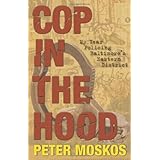
Average Reviews:

(More customer reviews)Despite the terrible cover (even by academic press standards), this looked right up my alley for a number of reasons: (1) a good friend just moved to Baltimore and I've been trying to read more about the city, (2) I know mainstream Baltimore pretty well and was interested in learning about a part of the city I've never ventured into, (3) I've been a big fan of The Wire since season one, and wanted to see how closely reality coincided with that drama, and (4) I've been on a bit of a "academic as participant/observer" reading binge lately, including books like Brothel, Rolling Nowhere, and Gang Leader for a Day, and wanted to compliment those with a inside look at policework.
Like those three books, this one was born from academic roots, as Moskos was scouting around for a project for his PhD dissertation. After approaching and being rejected by several city police forces, the Baltimore PD accepted his proposal to work as a cop for a year with the knowledge he would write about his experience. So, the good news is that his account of policing starts from day one at the academy and proceeds unbroken for twenty months, which is a marked contrast to some of the books mentioned above, in which the authors dip in and out of the culture/life they are exploring. The bad news is that everyone Moskos served with knew he was writing a book. The problem of observation influencing behavior is well-established in documentary film and ethnography, and Moskos seems to underplay it's effects a bit too much.
Some more good news is that Moskos is meticulous is outlining both the psychology and procedure of being a patrol officer. As a city employee myself, it didn't surprise me (though it did depress me), the extent to which urban policework is hindered by bureaucracy and administrative fiat. The overreliance on patrolling from cars, the strict adherence to the policy of immediate response to any call for service (311 or 911 call), the avalanche of paperwork generated by any officer activity, all of these contribute to a environment that lends itself to officers "gaming the system" for their own comfort and/or financial benefit. While I love this kind of insider procedural detail and the explanations of the mentality it engenders, the book suffers from being a good deal too dry.
To a certain extent, this reflects the reality of most policework, which is boring and laden with paperwork. However, the books I mentioned are all engaging precisely because their authors do a great job of making characters out of themselves an the subjects of their study, and that just doesn't happen here. Moskos never lets us get to know his fellow officers or much of himself, and without that personal connection, it ends up reading like a long social policy paper (or a revised dissertation, which it i). The ultimate policy conclusion of the book is not a shocking one, but for those interested in the "war on drugs" it's certainly worth reading, as it is capably outlined and grounded in Moskos' personal fieldwork. Basically, Moskos argues that the war on drugs is a total disaster from a policing perspective, creating a huge drain on resources that could be more effectively directed at other social problems. He believes that the country has yet to learn the lesson easily drawn from the history of alcohol prohibition (which he goes into in rather digressive length and detail), which is that making things illicit merely removes it from government control (and taxation), without reducing demand.
While I'm personally more or less on board with this conclusion and am heartened to see it supported up by Moskos' day-to-day patrolman experiences, it's not really what I came to read about. The book will tell you very little at all about Baltimore (perhaps because Moskos is not from there), and beyond spelling out some of street-level mechanics of the drug trade, there's not much here about East Baltimore you couldn't have gleaned from The Wire and/or The Corner. To a certain extent, one has to feel a little bad for Moskos, since that show kind of steals his thunder. Which bring up another point, his service was about seven years ago, and one has to wonder to what extent things have changed since then, if 9/11 has had an impact on policing, or the increased use of computers, for example.
In any event, while it's certainly readable (aside from numerous typos), it never really engages, and that's why I ultimately found it somewhat disappointing. I would highly highly recommend it to anyone thinking about becoming a city cop, and it' also probably worth reading if you're into criminology, ethnography, and drug policy -- otherwise it's probably of limited interest.
Click Here to see more reviews about: Cop in the Hood: My Year Policing Baltimore's Eastern District
Click here for more information about Cop in the Hood: My Year Policing Baltimore's Eastern District

0 comments:
Post a Comment